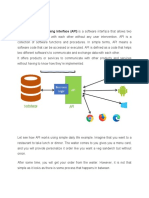0% found this document useful (0 votes)
6 views2 pagesAPI
APIs (Application Programming Interfaces) facilitate communication between software systems, allowing data exchange and service utilization. They are used in various applications such as payment gateway integration, social media sharing, weather data integration, and mapping services, providing benefits like enhanced functionality and improved user experience. Security measures for APIs include authentication, encryption, access control, and input validation.
Uploaded by
SavageCopyright
© © All Rights Reserved
We take content rights seriously. If you suspect this is your content, claim it here.
Available Formats
Download as DOCX, PDF, TXT or read online on Scribd
0% found this document useful (0 votes)
6 views2 pagesAPI
APIs (Application Programming Interfaces) facilitate communication between software systems, allowing data exchange and service utilization. They are used in various applications such as payment gateway integration, social media sharing, weather data integration, and mapping services, providing benefits like enhanced functionality and improved user experience. Security measures for APIs include authentication, encryption, access control, and input validation.
Uploaded by
SavageCopyright
© © All Rights Reserved
We take content rights seriously. If you suspect this is your content, claim it here.
Available Formats
Download as DOCX, PDF, TXT or read online on Scribd
/ 2

























































